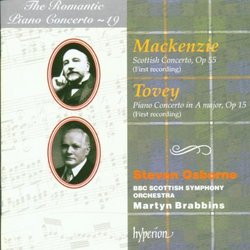| All Artists: Donald Tovey, Alexander Mackenzie, Martyn Brabbins, Glasgow BBC Scottish Symphony Orchestra, Steven Osborne Title: Mackenzie: Piano Concerto No. 19 / Scottish Concerto Members Wishing: 1 Total Copies: 0 Label: Hyperion UK Release Date: 9/8/1998 Album Type: Import Genre: Classical Styles: Forms & Genres, Concertos, Instruments, Keyboard, Symphonies Number of Discs: 1 SwapaCD Credits: 1 UPC: 034571170237 |
Search - Donald Tovey, Alexander Mackenzie, Martyn Brabbins :: Mackenzie: Piano Concerto No. 19 / Scottish Concerto
 | Donald Tovey, Alexander Mackenzie, Martyn Brabbins Mackenzie: Piano Concerto No. 19 / Scottish Concerto Genre: Classical
|
Larger Image |
CD Details |
CD ReviewsSINGLE MALT BRAHMS? NotATameLion | Michigan | 09/30/2003 (4 out of 5 stars) "First, a question: what is not to like about this disc? Nothing that I can hear.These concertos, one by Sir Donald Francis Tovey--an Englishman who worked extensively in Scotland, and one by Sir Alexander Campbell Mackenzie--a Scot who worked in England, may not be world beaters. They sure are wonderful all the same.Yes, Tovey may sound a lot like Brahms at times. Is that a bad thing? For all of his Brahmsian sensibility, Tovey's concerto has a Toveyian warmth and ease that is all its own. Call it Brahms on the rocks.Of the two works here, Mackenzie's concerto was the one that really grabbed me upon first listening. I am a fan of traditional Scottish music. It was fun to hear The Reel of Tulloch and Green Grow the Rashes in a classical setting. The Scottish Concerto has more thunder up front and more beauty in the middle than Tovey's.Yet the Tovey concerto is the piece that I have returned to the most over time. There is a charm to this music, particularly the finale, that is very endearing.Steven Osborne, who is himself Scottish, brings just the right touch to this disc. One minute he is racing up a mountain of virtuosity, the next he quietly meditating on the beauty of the piece.The BBC Scottish Symphony Orchestra and their conductor Martyn Brabbins rarely fail to impress me. This is a first class outfit and a first rate conductor. They show it here.This nineteenth installment of Hyperion's Romantic Piano Concerto series is very likable. Both pieces are fun, worthwhile and recorded beautifully. I recommend this disc highly." Forgotten masterpieces NotATameLion | 08/17/2002 (5 out of 5 stars) "Amazingly, this is the first recording of either of these concertos, which are far too original to be considered historical curiosities. Tovey is probably best known for his critical writings and editions of music, but was also a master composer as evidenced by this concerto written just in his 20s. Though the sleeve notes claim it strongly resembles Brahms, I think Tovey finds his own voice quite well here. None of the movements is extremely grave or serious on the surface, but the first reaches great climaxes with waves of orchestral sound and keyboard passages blending together in a nearly impressionistic way. The second is a reflective and sober slow movement, while the third is a catchy march with many contrapuntal sections. Mackenzie's Scottish Concerto is quite identifiable as such, since each movement is based around a traditional Scottish melody. Each movement evolves directly from the melody in quite an interesting way. The dramatic first movement leads into a warm slow movement and a very exciting finale.While obviously written by different composers with different intentions, the two concertos do show some similarities and complement each other very well. The superb performances by soloist and orchestra, plus great sound, combine to make this one of my favorite CDs in my whole collection. Let's hope that these two concertos by two composers with flawless musical sensibilities are heard as much as they deserve to be in the future." Tovey takes all janus_kreisler_sachs | the Midwest, USA | 07/23/2003 (4 out of 5 stars) "The Mackenzie work is basically a potpourri-type concerto that uses traditional Scottish melodies and original material in a similar vein. No profundity to be found here, to be sure. But the work can certainly be enjoyed for what it is: a loosely structured, flashy romp through several tunes.
Tovey is perhaps best known for his insightful (if sometimes quirky) writings on music, but his piano concerto shows that he could apply his musical knowledge to the craft of composition (no mean feat indeed!). Written in 1903 (six years after Brahms's death), the work is the closest thing to being Brahms's third piano concerto. The spacious yet tightly structured first movement shows the influence of the first movement of Brahms's second concerto, and is filled with rich harmonic progressions, some wonderfully knotty contrapuntal passages, ingenious development of themes and motives (the way themes and motives would grow and change into one another is really quite remarkable, a tour de force of musical development), and a piano part that is rich and muscular without being needlessly showy. The slow movement is pensive without being lugubrious, and the march-like finale brings the concerto to a spirited close. I must admit I sometimes feel the finale to be something of an anti-climax, especially after the intricate first movement. Nevertheless, I'm still very fond of Tovey's concerto, and I've been listening to it everyday for weeks now without tiring of it. Yes, it is not the most "progressive" piece of music for its time, but considering the fact that it takes up the mantle of a master (Brahms) who had died only six years before, I wouldn't dismiss it as a mere anachronistic curiosity. If you are a Brahms fanatic (as I am), do consider getting this CD for Tovey's magnificent concerto. Performances and sound are both top notch." |

 Track Listings (6) - Disc #1
Track Listings (6) - Disc #1